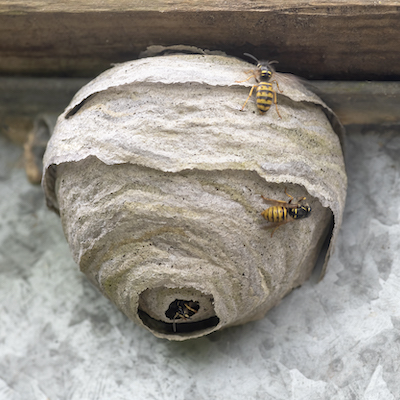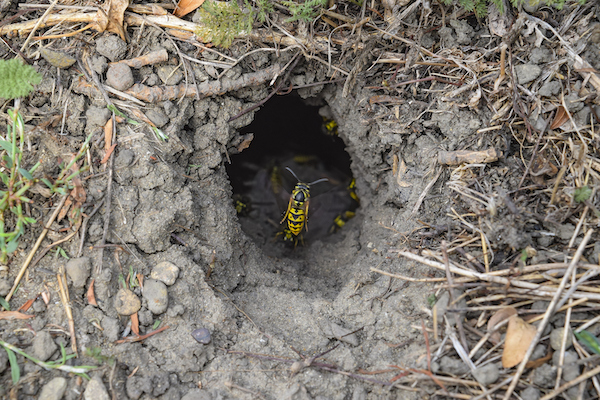European wasps are a dangerous invasive pest and although they are a “paper wasp”, they are very different from our native Australian paper wasps.
Where did European wasps come from and where do they live in Australia?
European wasps, Vespula germanica, were first found in Tasmanian in 1959. It is not known which country they first came from, but they have now spread across large parts of southern Australia including Tasmania, Victoria, New South Wales and Western Australia. They haven’t spread much higher than the Hunter Valley as they prefer more temperate, less humid conditions.
European wasp life cycle
New queens create a small paper nest using chewed wood fibres. She lays a few eggs which she tends to herself until they hatch. The queen feeds the larvae regurgitated food. However, once these larvae have developed into adult wasps, it is these worker wasps that tend to the nest generation of larvae and forage for food. Wasps will forage for protein for the larvae (meat and insects) but tend to go for sugary foods for themselves (such as soft drink!).
The nest gets bigger through the year, reaching its maximum size in autumn. In late summer the queen lays eggs that will develop into the new reproductives. These kings and queens leave the nest to mate in late summer. Whilst the males die after mating, the queen feed voraciously to build up their food reserves for winter. They find a sheltered place to hibernate during the cooler months, emerging to start a new nest in spring.
In Europe, the existing nests die off as temperatures drop in winter. However, in Australia, due to the mild winters, often the nests do not die off and continue to grow year on year. This can result in massive nests of up to 100,000 wasps or more!
Nest location
Although homeowners are more likely to spot wasp nests on buildings or in roof-voids, actually only around 20% of European wasp nests are above ground, in buildings or in trees. The majority of nests are built underground in well-drained soil, often in a bank or area of raised soil.


Pest status
European wasps present a significant public health risk with their stings being very painful. Unlike honeybees, individual wasps will sting multiple times. In addition, they will release alarm pheromones to attract their nest mates, often resulting in a mass attack. If the victim suffers an anaphylactic shock, the stings may be fatal.
However, European wasps can also be a significant pest in agriculture where their passion for sweet foods attracts them to a variety of soft fruit crops. Not only do they cause damage directly to fruit and create problems during harvesting, but their presence can also promote aphid and scale insect populations (as they feed on the honeydew they produce), which reduces fruit production. In the Hunter Valley their presence can be a significant issue in the vineyards.
Why use a pest professional to get rid of wasps?
There are two key reasons why it is better to use a pest professional to get rid of wasps, rather than attempting to do-it-yourself. Firstly, safety should always be the number one priority. When tackling a European wasp nest, it is important to be wearing the correct safety gear. Not only does this avoid getting stung, but it also allows the nest to be treated without having to run away. Falls from ladders and trips are all too common when trying to get away from a nest following treatment!
Secondly, pest professionals can access a range of products for wasp control. Although wasp aerosols are available in hardware stores, they are not actually the best products for European wasps. European wasp nests have a small entry hole and so it can be difficult to get the insecticide inside the nest. Pest professionals will generally use insecticide dust, which is often pumped into the nest through a flexible hose to allow ease of access. This is effective for nest above ground or underground. Sometimes the nest cannot be located or accessed (it may be on a neighbouring property), and pest professionals can use wasp baits to control the nest.
If you spot a wasp nest on your property or have a wasp problem that needs investigating, give the experts at Rebel Pest Professionals a call for a professional wasp treatment. We cover Newcastle, Port Stephens, Lake Macquarie and the Hunter Valley – The Bug Stops with Us!

